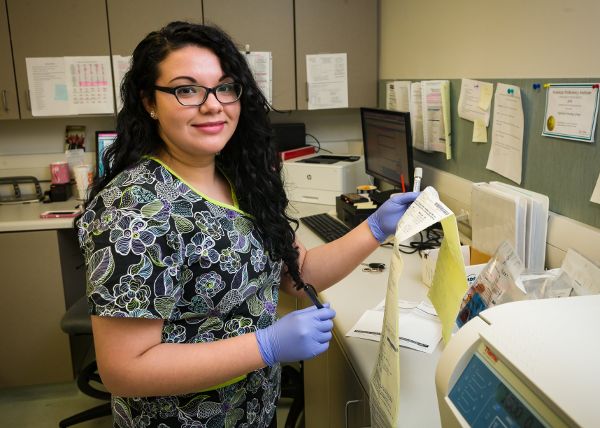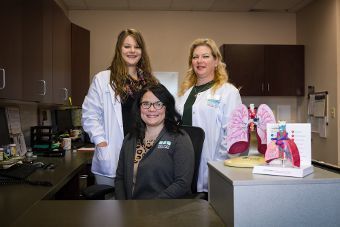Overview
Thyroid cancer begins when cells in the thyroid start to grow uncontrollably. A tumor can form when more cancer cells develop, and it can spread to other areas of the body. As it grows and spreads, the cancer becomes more advanced. Many abnormal growths of the thyroid (nodules) are benign, or not cancerous.
The thyroid is a gland in the front of the neck, with lobes on either side of the trachea below the Adam’s apple. The thyroid gland produces thyroid hormone, which regulates metabolism, and calcitonin, which regulates the body’s use of calcium.
Types of thyroid cancer include:
- Differentiated
- Papillary carcinoma or papillary adenocarcinoma
- Most thyroid cancers are differentiated cancers, and 8 out of 10 are papillary cancers
- Follicular carcinoma or follicular adenocarcinoma
- Hṻrthle cell or oxyphil cell carcinoma
- Papillary carcinoma or papillary adenocarcinoma
- Medullary
- Anaplastic (an aggressive undifferentiated tumor)
- Thyroid lymphomas
- Thyroid sarcomas
Parathyroid cancer, occurring in the parathyroid glands attached to the thyroid, can occur, but are very rare.
Symptoms
Often thyroid cancer causes a lump in the neck. It is important to note that lumps in the thyroid can be caused by a number of other non-cancerous causes, but it is important to be checked by a medical professional with this symptom.
Other symptoms of thyroid cancer may include:
- Swelling in the neck
- Pain in the front of the neck
- Persistent hoarseness or other vocal changes
- Trouble swallowing or breathing
- Persistent cough, not due to a cold
Risk Factors
Thyroid cancers occur three times more often in women than in men, and risk is highest in middle age for women (ages 40-60) and later in life for men (ages 60-80).
While most cases of thyroid cancer are not associated with a family history of the disease, certain conditions can increase the risk of developing the cancer:
- An abnormal gene can cause familial medullary thyroid carcinoma. If this condition runs in your family, ask your doctor about monitoring blood-work or other diagnostic procedures, and about whether genetic testing would be appropriate.
- Familial adenomatous polyposis (FAP) is a condition of the colon which increases risk of colon cancer as well as other cancers, including thyroid cancer.
- Cowden disease increases the risk of thyroid problems including benign growths and thyroid cancer.
- Carney complex, type I may cause benign growths and hormone problems, and increases the risk of follicular thyroid cancer.
- Other kinds of thyroid carcinomas can occur more often in families and appear earlier in life. Certain gene mutations are associated with these cancers. Discuss genetic counseling with your doctor if your family history indicates any of these conditions.
Diets low in iodine, though rare in the United States, may increase the risk of thyroid cancer. Radiation exposure is a risk factor as well, particularly when exposure includes the head or neck, occurs earlier in life, or occurs in higher doses.
Prevention
Most diagnoses of thyroid cancer are not associated with a known risk factor or behavior, it is not possible to prevent most cases.
Radiation exposure is the most significant known risk factor, but high levels of exposure are rare, since changes in the practice of medicine have reduced or eliminated the practice of using radiation to treat less serious diseases and technology improvements have reduced the level of radiation exposure in diagnostic imaging procedures. It is not known how much low-dose radiation from imaging tests like X-rays increases the risk of thyroid cancer for children, so it is best to ensure that these tests are only performed when truly necessary and at the lowest effective dose, even though the increase in risk would likely be small.
Genetic testing is available for detection of familial medullary thyroid carcinoma, which can be prevented or treated early.
Diagnosis
Thyroid cancer may be diagnosed during a routine exam or after a patient visits the doctor with symptoms. A detailed medical history and physical exam will be performed. Your doctor will ask questions about your risk factors and family history. The physical exam will include a close examination of the thyroid and lymph nodes in the neck.
A biopsy of thyroid tissue is needed to confirm a diagnosis of thyroid cancer, and can be performed in the doctor’s office with minimal time and discomfort. Imaging tests including ultrasound, radioiodine scans, X-rays, CT scans, MRI scans, or PET scans may be used to examine the cancer’s spread, and blood tests may be used to determine the level of functioning of the thyroid.
Other tests may be used in addition to the diagnostic tools discussed above. These include additional blood tests and laryngoscopy.
Treatment
The treatment plan will depend on the stage of the cancer, as well as other factors. Our doctors will work closely with you and your family determine the best treatment plan for you. Options for treatment could include:
- Surgery
- Radioactive iodine treatment
- Thyroid hormone therapy
- External beam radiation therapy
- Chemotherapy
- Targeted therapy
Your doctor may decide more than one of these treatment options will be in your best interest. Most thyroid cancer patients can achieve full remission, especially if the cancer has not spread.







